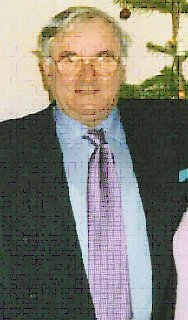Author of
NOTHING BUT MY SWORD
 Q: You have written one of
the most interesting books I have read in a long time. Please tell
our readers where you learned to write? Q: You have written one of
the most interesting books I have read in a long time. Please tell
our readers where you learned to write?
A: My writing style comes naturally, but
it was also tailored in style to suit a modern readership. History
can be a dry subject, so it was quite deliberately written in a way
that was fast moving, in an almost newspaper way, in order to bring
it to the reader as a novel rather than the serious historical
biography it was always meant to be. We currently have a lot of
British television programmes where various professors stalk old
battlefields and tell the viewers how it all happened with relaxed
insights into the main characters…I tried to do the same in print.
Q: You have developed an
easy writing style. Do you write as you talk or is this your writing
style?
A:
I pretty well
write much as I talk. It can’t be done any other way for my readers
otherwise the story would not flow coherently. I’m like most
people, I guess, when my writing flows, I just have to go with it
until it dries up on me, and that can mean sitting at a word
processor well into morning.
Q: Tell us a little about
your writing history. What publications or other books have you
written?
A: Nothing But My Sword was my
first book and was taken up by the first publisher I approached with
the manuscript. It got to number five in the best-seller list of
Waterstones, one of Britain’s biggest booksellers. Previously, my
only attempts at writing were a column for my local newspaper.
Q: Unfortunately, there is no mention in the paperback of Nothing
But My Sword of your background or what you do, and our readers
would like to know more about you. Would you be kind enough to
supply us a brief sketch of your life?
A: I left school to become a
joiner/carpenter, met my wife while repairing windows at the school
where she taught and got married nine months later with our only
daughter, Jenny, already on the way. We bought an old house and
during evenings, holidays and weekends tore the old house apart and
remade it to suit us, doing it all myself over a two-year period. I
then joined the Post Office which allowed me to both be a part-time
joiner, Regional Councillor/District Councillor and a Union rep,
apart from being very active politically. Having retired from the
Post Office at the same time as my wife, Ann, retired from
education, I also managed to lose my Council seat and, with nothing
much to do, decided to write a book as a way to usefully spend my
time. The book took two years to research and write, and I recovered
my Council seat shortly before it was published. At the beginning
of my authorship, relatives would ask solicitously, “And what are
you doing now?” and, on getting an unexpected answer, replied, “Ah,
yes, a book…a book.”
Q: What was it about James Keith that made you want “to restore him
to his rightful place as one of Scotland’s “greatest soldiers and
greatest men”? When did you first decide to set out on this task,
and how long did it take you to complete it?
A: I chose James Keith because his story
had never been written and, since I don’t read fiction, there was no
way I could bring myself to write it. Besides, it seemed at that
time most of the research would be a simple matter to put together
(Just how wrong can you get things?). Writing and researching the
book became an obsession and an everyday chore, which began shortly
after my unemployment in 2000 and went on for the next two years. It
also helped to have a subject who was larger than life and who
miraculously survived a lifetime of battles and escapades that
Hollywood would be hard put to match - and it was all totally true
and factual. That apart, my task was made easier because I was able
to understand, respect, empathise and take a strong liking to my
long dead subject.
Q: What book are you working on now? Please tell us a wee bit
about it.
A: Field Marshal James Keith was born and
brought up just some two miles from where I live and, incredibly,
Tsar Peter the Great of Russia had another soldier who was born just
some five miles from where I live as his right hand man…his name was
General Patrick Gordon. Most of my research on Gordon has been
completed, and I have made a few false starts on his story, perhaps
because I have been re-elected to the Council and do not have the
same amount of time and because Gordon has yet to come through to me
as a person in the way that James Keith did. It has been quite a
bit more difficult to research in that Keith was born in 1696 and
Gordon 1635. The farther we go back in time, the harder it gets to
find out the facts and crosscheck them.
Q: Thank you for being so cooperative with me regarding the book
review and this chat. Is there a final word you would like to leave
with our readers?
A: I suppose everyone at some time or
another feels they have a book to write, a story to tell. My advice
is to just get on with it and don’t be distracted or put off from
the task by either a seemingly blank wall in the research or the
relatives who look knowingly at each other across the room and
murmur, “Ah, yes, of course, a book…” (1/10/2004) |

